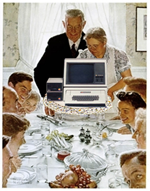 Don’t look now, but it’s very nearly 2010. Which makes this a good time to recap the most popular articles we published all year long. Here they are, in case you missed any or would like to revisit them. (And congrats to computer archeologist Benj Edwards, who wrote three of the top four.)
Don’t look now, but it’s very nearly 2010. Which makes this a good time to recap the most popular articles we published all year long. Here they are, in case you missed any or would like to revisit them. (And congrats to computer archeologist Benj Edwards, who wrote three of the top four.)
1. 15 Classic PC Design Mistakes: Benj critiques vintage PCs, from the era’s masterpieces (the Apple II) to its forgotten curiosities (Mattel’s misbegotten Aquarius.)
2. Atari’s 1984 Touch Tablet: A Retro Unboxing: Benj finds and buys a shrinkwrapped peripheral from the golden age of home PCs, and documents the experience of unwrapping and installing it.
3. Commodore 64 vs. the iPhone 3GS: The most detailed comparison of a really old computer and a really neat phone you’re likely to see.
4 15 Classic Game Console Design Mistakes: Benj follows up his PC mistakes piece with one about regrettable game console “features.” (I like the Nintendo Entertainment System’s dreaded “blinkies.”)
5. Hey, Lauren! Is Apple’s 17-Inch MacBook Pro Expensive?: Inspired by a new Windows commercial that paints Macs as pricey and excessively hip, I compare the MacBook Pro to a bunch of Windows laptops, spec by spec and feature by feature.
6. Windows 7: Download It if You Dare: I briefly note that the public beta of Microsoft’s OS is available.
7. Mouse Trouble: 20 Weird Pointing Device Patents: Fascinatingly odd pointing devices, including my favorite: the pointy, palm-threatening pyramid mouse.
8. The Secret Origins of Clippy: A look at Microsoft’s multiple attempts to make computing better through animaed onscreen helpers, from Bob to Clippy to a bunch you never knew about.
9. Game Boy Oddities: In celebration of the iconic Nintendo handheld’s twentieth anniversary, Benj Edwards looks at some of its many offbeat examples–from the Game Boy that dispenses nitrous oxide to the one that went to Iraq and back.
10. The Amazing World of Version Numbers: I ruminate on such essential questions as “What’s the highest version number ever?”
11. Your First Look at Nook: A review of Barnes & Noble’s ambitious, feature-filled, and rough-around-the-edges e-reader.
12. Do You Think This is Sony Ericsson’s Answer to the iPhone? Idou!: First photos of a fancy phone that went on to ship as the Satio.
13. Is Gmail Down? Ask Twitter!: It dawns on me that Twitter is a good place to go for answers to real-time questions. (Hey, this was back in February–that’s a decade or two ago in Twitter time.)
14. The Patents of Steve Jobs: We all know about the gadgets Apple’s co-creator worked on that have changed the world. Here are a few that haven’t, from his staircase to…a tablet computer. (Sounds interesting!)
15. The Press Releases of the Damned: Yes, there was a time when the AOL-Time Warner merger, the release of Palm’s Foleo, and the layoff of Circuit City’s most experienced staffers were trumpeted as good news.
Can we draw any lessons from the above stories? Absolutely: The only thing folks like to read about more than the newest tech products are some of the oldest ones. Thanks to everyone who made these pieces hits–and I’ll let you know if any story we publish in the next two weeks squeaks onto the top fifteen for 2009.

 Back in the early 1980s, it wasn’t a given that a family needed a home computer–or even that they knew exactly what a home computer was. So ads for PCs and related products made sure to show happy families–sometimes eerily happy families–crowded around the computer, enjoying the heck out of their purchase.
Back in the early 1980s, it wasn’t a given that a family needed a home computer–or even that they knew exactly what a home computer was. So ads for PCs and related products made sure to show happy families–sometimes eerily happy families–crowded around the computer, enjoying the heck out of their purchase.
 It’s not
It’s not 
 You’re familiar with Moore’s law. You know all about the accelerating pace of information technology. Regardless, you’re still amazed at how many gigabytes you can fit in your pocket these days. Remember how your first computer’s entire hard disk only held 20 megabytes? You could accidentally swallow a thousand times as much data now if you weren’t careful.
You’re familiar with Moore’s law. You know all about the accelerating pace of information technology. Regardless, you’re still amazed at how many gigabytes you can fit in your pocket these days. Remember how your first computer’s entire hard disk only held 20 megabytes? You could accidentally swallow a thousand times as much data now if you weren’t careful.
 If our ancestors of the late nineteenth century hitched a time-machine ride to 2009, nearly everything about the technology we use would leave them dumbstruck. They would, however, immediately recognize our computer keyboards, nearly all of which work in pretty much the same manner as the ones on Victorian-era typewriters. Which is not to say that a bevy of inventors haven’t tried to improve on standard-issue QWERTY. It’s just that most of their bright ideas go absolutely nowhere. Herewith, a gallery of
If our ancestors of the late nineteenth century hitched a time-machine ride to 2009, nearly everything about the technology we use would leave them dumbstruck. They would, however, immediately recognize our computer keyboards, nearly all of which work in pretty much the same manner as the ones on Victorian-era typewriters. Which is not to say that a bevy of inventors haven’t tried to improve on standard-issue QWERTY. It’s just that most of their bright ideas go absolutely nowhere. Herewith, a gallery of